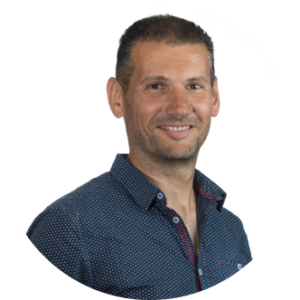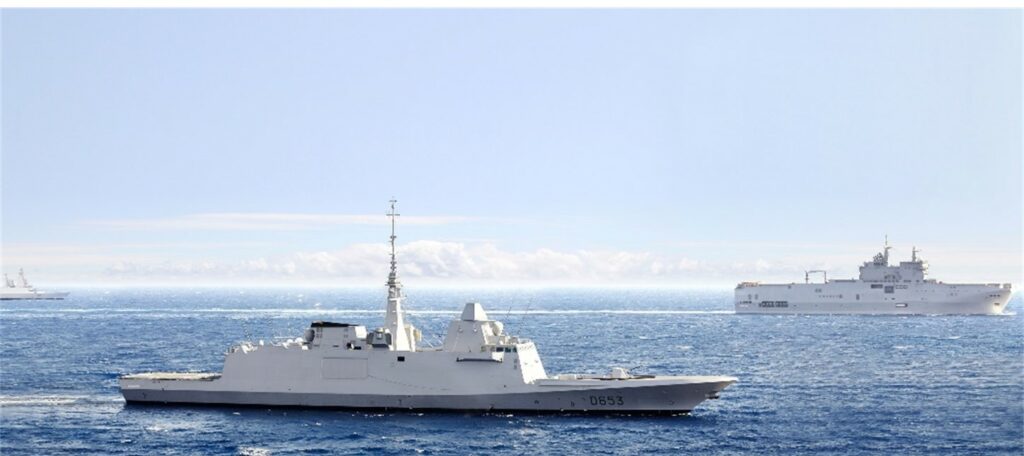Ekium is participating in the industrialization of the Defense and Intervention Frigates program for Naval Group.

We are going to meet Laurent, Business Manager at Ekium Cherbourg (formerly DIVA Ingénierie).
Since 2020, he has participated in the industrialization of the new Defense and Intervention Frigates (FDI) program on behalf of our client Naval Group, in Lorient (56). This project is based, to date, on the supply of 5 frigates for the French National Navy as well as an export program on behalf of the Greek National Navy.
The Defense and Intervention Frigate (FDI) is a multirole combat vessel.
The IDF programme is helping to renew and strengthen France’s surface fleet, in line with the 2019-2025 Military Programming Law.
With a length of around 120 metres and a beam of 17.7 metres, this new frigate can reach a speed of 27 knots (50 km/h).
Fully armed with missiles, the IDF can carry a heavy helicopter and an aerial drone, as well as two commando boats for special forces. They are equipped with the Seafire radar with four fixed panels which, combined with the missile deployment system, gives them area defence capabilities.
Since its launch, this large-scale project has been divided into 3 main phases:
Conception (Moving in): Fitting out is a term specific to Naval Group which describes the 3D modelling of equipment, pipes, hulls, floors, bulkheads, cables, etc. It is a central design activity, consolidating the iterative contribution of architects, designers, systems engineers, purchasable functions, technologists, etc.
Industrialisation: Laurent and his team are involved in this phase, which consists of drawing up the industrial file from the design data in line with the logic of the ship’s construction.
Production: consists of manufacturing, assembly and compliance monitoring.
This project is completely innovative, with the introduction and use of new methodologies, new CAD (Computer-Aided Design) and industrialisation tools, including ODIN (Outils Dédié à l’Industrialisation). A complete overhaul of working methods has been adopted by all!
Focus on the Industrialisation phase:

Industrialisation is Laurent’s day-to-day job, as it is for all the people working on site. In simple terms, it involves retrieving all the data produced during the design phase, and then processing, enriching and structuring it in the ODIN tool so that it can be made available to the production workshop and/or on board for final assembly. This concerns in particular :
- Drawing up manufacturing assembly lines
- Generation of control campaigns to be propagated
- Issue materials/equipment
- Provision of definition drawings
In other words, by standardising and optimising industrial processes, it guarantees the producibility, maintainability and constructability of products in line with the quality, cost, lead time, safety and environmental objectives defined in the programme.
This industrialisation phase is divided into 4 areas:
- Boilermaking: fluids and networks
- Mechanics: structural elements, carling
- Electricity: electrical network cables inside the vessel
- The hull: overall structure of the ship and its equipment
Laurent’s teams have played a major role in the boilermaking and mechanical engineering aspects of the project from the outset, and have recently been added to the electrical engineering team.
During the industrialisation phase of the first vessel, up to 18 Ekium employees worked together on boiler making and mechanical engineering.
A construction logic to be respected
A ship is built according to a logic of ‘assembly’ of individual blocks, corresponding to different parts of the ship. The design and manufacture of each micro-block is carried out independently, and the micro-blocks are gradually assembled to form a single unit.
This technique allows us to shorten lead times by working on several blocks at the same time and then proceeding with the assembly phases in a staggered manner, so that we don’t need to manufacture the whole thing at the end.
For several years now, Laurent has been fascinated by this technical challenge that is asked of him on a daily basis for the construction of these 6 frigates: to take an interest, to master the language of an environment that he didn’t know before, to understand how the project works in its entirety and in particular the interactions between the different departments and players, and then to contribute his expertise with the aim of continuously improving and optimising the working methods.
“The difficulty of the subject is in particular to maintain the conformity of the industrialisation data for each ship under construction by taking into account in real time the evolutions of definition and REX on board as well as the specificities (Greece/France). We have to take into account the fact that 6 ships are being built simultaneously at the Lorient site, with very tight deadlines to be met,” explains Laurent.
It’s a real challenge for Laurent and his team!